Headboards: A Bed’s Best Friend
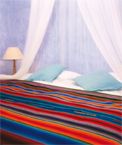
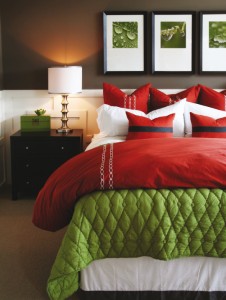 When I first met my friend Brooke Pettyjohn in the summer of 1997, she was out on her porch painting that quintessential piece of Americana: a white picket fence. With visions of Tom Sawyer toiling in my head, I was surprised to learn that while she was in fact, painting a picket fence, it wasn’t going to be used in the traditional sense. Instead of installing it in her yard, Brooke planned to use the fencing as a headboard for the bed in her guest room. Intrigued, I was eager to see the final product. When the project was finished, the picket fence headboard paired with bright white bedding and periwinkle-colored accents resulted in a light, airy, garden-inspired guest haven. The picket fence headboard would be the first of several clever headboards that Brooke has fashioned over the years.
When I first met my friend Brooke Pettyjohn in the summer of 1997, she was out on her porch painting that quintessential piece of Americana: a white picket fence. With visions of Tom Sawyer toiling in my head, I was surprised to learn that while she was in fact, painting a picket fence, it wasn’t going to be used in the traditional sense. Instead of installing it in her yard, Brooke planned to use the fencing as a headboard for the bed in her guest room. Intrigued, I was eager to see the final product. When the project was finished, the picket fence headboard paired with bright white bedding and periwinkle-colored accents resulted in a light, airy, garden-inspired guest haven. The picket fence headboard would be the first of several clever headboards that Brooke has fashioned over the years.
Why settle for basic, though, when some easy accessorizing can add visual interest as well as comfort to your boudoir? If you are among the many who already own a traditional “bed” (that is, your mattress is supported by both a headboard and footboard that match), consider creating a new look and feel for your sleeping arrangement by choosing a new headboard.
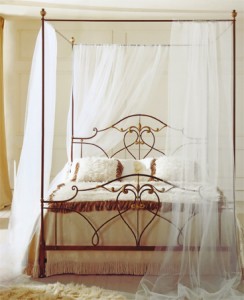 The Basics
The BasicsA bed consumes much of a room’s volume. Depending on its style and design, a bed frame may appear delicate, massive, or somewhere in between. Keep the proportions of your room in mind when choosing your headboard.
Standard headboards generally fall into three categories: metal, (light and airy) wood (for a structured feel), and upholstered. White-painted antique metal headboards are one of the lighter styles, bringing a feminine touch to a bedroom. Think of the “shabby chic” or cottage trend that became popular in recent years that reintroduced a look of old-fashioned, clean comfort using varying shades of white as well as vintage fabrics. There is a wide choice of metal-framed beds, which come in several finishes, ranging from gunmetal to chrome and in a selection of powder-coated colors.
Depending on their size, carved wooden headboards can create a dramatic focal point in the bedroom. Dating back to 17th-century Europe, the Baroque period is characterized by intricate, majestic and ostentatious details. Due to the opulent nature of this style, it’s a good plan to keep other furnishings spare if your headboard taste runs to the Baroque.
The painted wood style, popularized by classic Swedish style, lends a simple charm that suits both modern and period homes. And here’s a bonus: A painted headboard can be given a fresh look with a new coat of paint. There are estate stores in our area with rooms devoted to headboards and footboards, as well as stores that sell brand-new pieces just waiting for your creative touch. Explore different painting techniques, such as faux finishing, or add a bold monogram.
Upholstered or padded headboards have their origins in European style, specifically French and Swedish. Because of their comfort and luxurious feel, they became popular in the early part of the 20th century and have never waned in their appeal. The padded back provides great comfort for reading in bed. Nail-head trim and piping can be used to accentuate the shape, and fabric can be customized to your exact wishes.
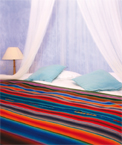 Beyond the Basics
Beyond the BasicsThese examples cover the basics, but we can all take a cue from my friend Mrs. Pettyjohn and begin to view objects meant for other purposes as possibilities for headboards. Some unusual but very achievable ideas include repurposed architectural salvage such as doors or shutters, fireplace mantels, weathered wood, trellis or picket fencing, or shelving cubes. Use bifold doors, or three-piece standing screens, which can be either painted or upholstered.
Rather than limiting your options to a substantial piece of metal or wood, consider using a blocking technique to mock the shape of a headboard. Hang a painting, a collection of flags, gorgeous framed wallpaper or fabric, or a canvas awash with just one color. If you use these types of graphic substitutes, there are a few considerations to make prior to hanging. Presumably, these wall hangings will serve as objets d’art, rather than merely a functional piece of your bed. They must be treated as such for optimal results. Here’s how:
- Use a simple frame. The more ornate the frame, the more visual distraction there will be from what is inside the frame.
- Install a light over the hanging to make it a beautiful focal point.
- Look for artwork that is big and bold. Small-scale images will be difficult to view over the distance of the bed.
- Hang your piece high enough so the pillows (or your head!) won’t rest against it.
- Hanging a painting works best in a room with ample footboard space, and is ideal in a room where the bed’s head is directly opposite the room’s entrance. This way you can really see and enjoy the painting.
Children’s Headboards
In a child’s room, use a headboard to add warmth and whimsy, to continue the room’s theme, and most importantly, to create a haven for your little one.
The sky’s the limit when it comes to headboards for children. Use what you might just have a huge supply of: artwork by your very own little artist.
- Hang cork squares, pegboard, or chalkboard tiles to display art or ephemera.
- Hang visually appealing ribbon to form large swaths of “clothesline.” Hang prized artwork with brightly colored clothespins.
- Use an oversized frame to house a collection of original artwork.
- Use an outline of your child, complete with details (yarn hair, button eyes) in an oversized frame.
- Measure and block out a space on the wall to paint with one primary color, or paint with chalkboard paint.
- Hang a collection of game boards.
- Attach two fabric window panels (or shower curtains) at a center point on the ceiling or wall above the bed, and drape down either side of the bed.
- Choose from one of the many beautiful, quirky and brightly colored children’s quilts available and hang it behind the bed as a headboard.
- Hang a grouping of adhesive-backed mirrors.
Some more complex ideas (which most likely require a professional but are still fun to visualize) include:
- An “enchanted forest” headboard, fashioned with clean branches or narrow birch logs (these should be sprayed with polyurethane so they don’t splinter apart). Glue or nail outdoor treasures to plywood.
- Use rough-hewn planks to create a “Wild West” or camping-themed headboard.
- Build the frame of a puppet theater around the bed and suspend marionettes from the top of the theater frame.
- Build an oversized dollhouse, complete with storage shelves.
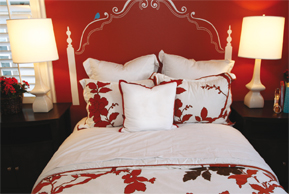 Tips for Tying it All Together
Tips for Tying it All Together
- Measure the dimensions of your room, as well as the door of your bedroom, before you buy anything to be sure that your gorgeous, one-of-a-kind find from the antique store will fit.
- Measure the headboard’s dimensions as it will appear on the wall and make a paper template to be sure the scale is correct. You don’t want your dream headboard to get “lost” on the wall, nor do you want it to be too massive.
- When using architectural salvage, be sure to anchor your treasure firmly to the wall, using brackets and screws.
- If your headboard is not upholstered, plan to add comfortable pillows (some firm and some soft) so reading in bed is comfortably relaxing.
- The top of the mattress should be at a level that makes it easy for you to get in and out of bed, and should not obscure the headboard.
- Contact local professionals. We are lucky to have some master craftsmen living in our area who can build exactly what you envision.
With a bit of creativity, an inquisitive eye, and a desire to shake up your bed, your new headboard is one project away.
Resources
House Beautiful: Decorating School, by Tessa Evelegh
The New Kidspace Idea Book, by Wendy A. Jordan
Domino: The Book of Decorating, by Deborah Needleman et al






